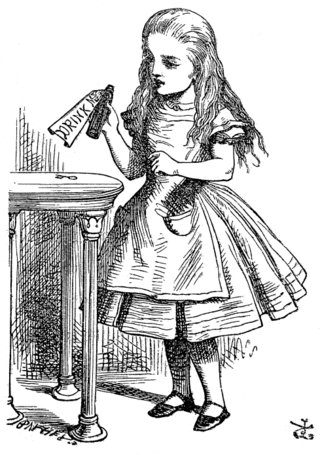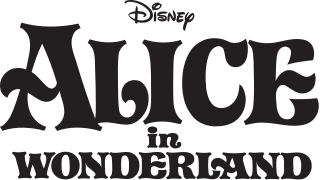Adventures in Wonderland may refer to:
Bill(s) may refer to:

Through the Looking-Glass, and What Alice Found There is a novel published on 27 December 1871 by Lewis Carroll, a mathematics lecturer at Christ Church, University of Oxford, and the sequel to Alice's Adventures in Wonderland (1865). Alice again enters a fantastical world, this time by climbing through a mirror into the world that she can see beyond it. There she finds that, just like a reflection, everything is reversed, including logic.

Alice's Adventures in Wonderland is an 1865 English children's novel by Lewis Carroll, a mathematics don at Oxford University. It details the story of a young girl named Alice who falls through a rabbit hole into a fantasy world of anthropomorphic creatures. It is seen as an example of the literary nonsense genre. The artist John Tenniel provided 42 wood-engraved illustrations for the book.
Alice in Wonderland may refer to:

The Hatter is a fictional character in Lewis Carroll's 1865 book Alice's Adventures in Wonderland and its 1871 sequel Through the Looking-Glass. He is very often referred to as the Mad Hatter, though this term was never used by Carroll. The phrase "mad as a hatter" pre-dates Carroll's works. The Hatter and the March Hare are referred to as "both mad" by the Cheshire Cat, in Alice's Adventures in Wonderland in the sixth chapter titled "Pig and Pepper".

The Queen of Hearts is a fictional character and the main antagonist in the 1865 book Alice's Adventures in Wonderland by Lewis Carroll. She is a childish, foul-tempered monarch whom Carroll himself describes as "a blind fury", and who is quick to give death sentences at even the slightest of offenses. One of her most famous lines is the oft-repeated "Off with his/her head!" / "Off with their heads!"
Alice may refer to:
Wonderland may refer to:
The title character in a narrative work is one who is named or referred to in the title of the work. In a performed work such as a play or film, the performer who plays the title character is said to have the title role of the piece. The title of the work might consist solely of the title character's name – such as Michael Collins or Othello – or be a longer phrase or sentence – such as The Autobiography of Malcolm X, Alice in Wonderland, or The Adventures of Tom Sawyer. The title character is commonly – but not necessarily – the protagonist of the story. Narrative works routinely do not have a title character, and there is some ambiguity in what qualifies as one.
The king of hearts is a playing card in the standard 52-card deck.

Adventures in Wonderland is a 1992–1995 American live-action/puppet musical television series based on the novels Alice's Adventures in Wonderland (1865) and Through the Looking-Glass (1871) by Lewis Carroll as well as the 1951 animated film. In the series, Alice, is portrayed as a girl who can come and go from Wonderland simply by walking through her mirror.
The queen of hearts is a playing card in the standard 52-card deck.

Lewis Carroll's books Alice's Adventures in Wonderland (1865) and Through the Looking-Glass (1871) have been highly popular in their original forms, and have served as the basis for many subsequent works since they were published. They have been adapted directly into other media, their characters and situations have been appropriated into other works, and these elements have been referenced innumerable times as familiar elements of shared culture. Simple references to the two books are too numerous to list; this list of works based on Alice in Wonderland focuses on works based specifically and substantially on Carroll's two books about the character of Alice.
Fiona Elizabeth Fullerton is a British actress and singer, known for her role as Alice in the 1972 film Alice's Adventures in Wonderland and as Bond girl KGB spy Pola Ivanova in the 1985 James Bond film A View to a Kill.

Alice's Adventures in Wonderland is a 1972 British musical film directed by Australian filmmaker William Sterling, based on Lewis Carroll's 1865 novel of the same name and its 1871 sequel, Through the Looking-Glass. It had a distinguished ensemble cast and a musical score composed by John Barry with lyrics written by Don Black. In addition, make-up artist Stuart Freeborn created film visuals based on the original drawings by John Tenniel from the first edition of the novel.
Down the Rabbit Hole is a metaphor for adventure into the unknown, from its use in Alice's Adventures in Wonderland. It may also refer to:
Malice in Wonderland may refer to:
Alice's Adventures in Wonderland is a ballet in three acts by Christopher Wheeldon with a scenario by Nicholas Wright, based on Alice's Adventures in Wonderland by Lewis Carroll. It was commissioned by The Royal Ballet, Covent Garden, and the National Ballet of Canada, and had its world premiere on Monday, 28 February 2011. The music by Joby Talbot is the first full-length score for the Royal Ballet in 20 years. It is also the first full-length narrative ballet commissioned by The Royal Ballet since 1995.

Alice, the main protagonist of Lewis Carroll's novels Alice's Adventures in Wonderland (1865) and Through the Looking-Glass (1871), has been adapted to several media.

Alice in Wonderland, or simply Alice, is a Disney media franchise, commencing in 1951 with the theatrical release of the animated film Alice in Wonderland. The film is an adaptation of the books by Lewis Carroll, the 1865 novel Alice's Adventures in Wonderland and its 1871 sequel Through the Looking-Glass, which featured his character Alice. A live-action film directed by Tim Burton was released in 2010.